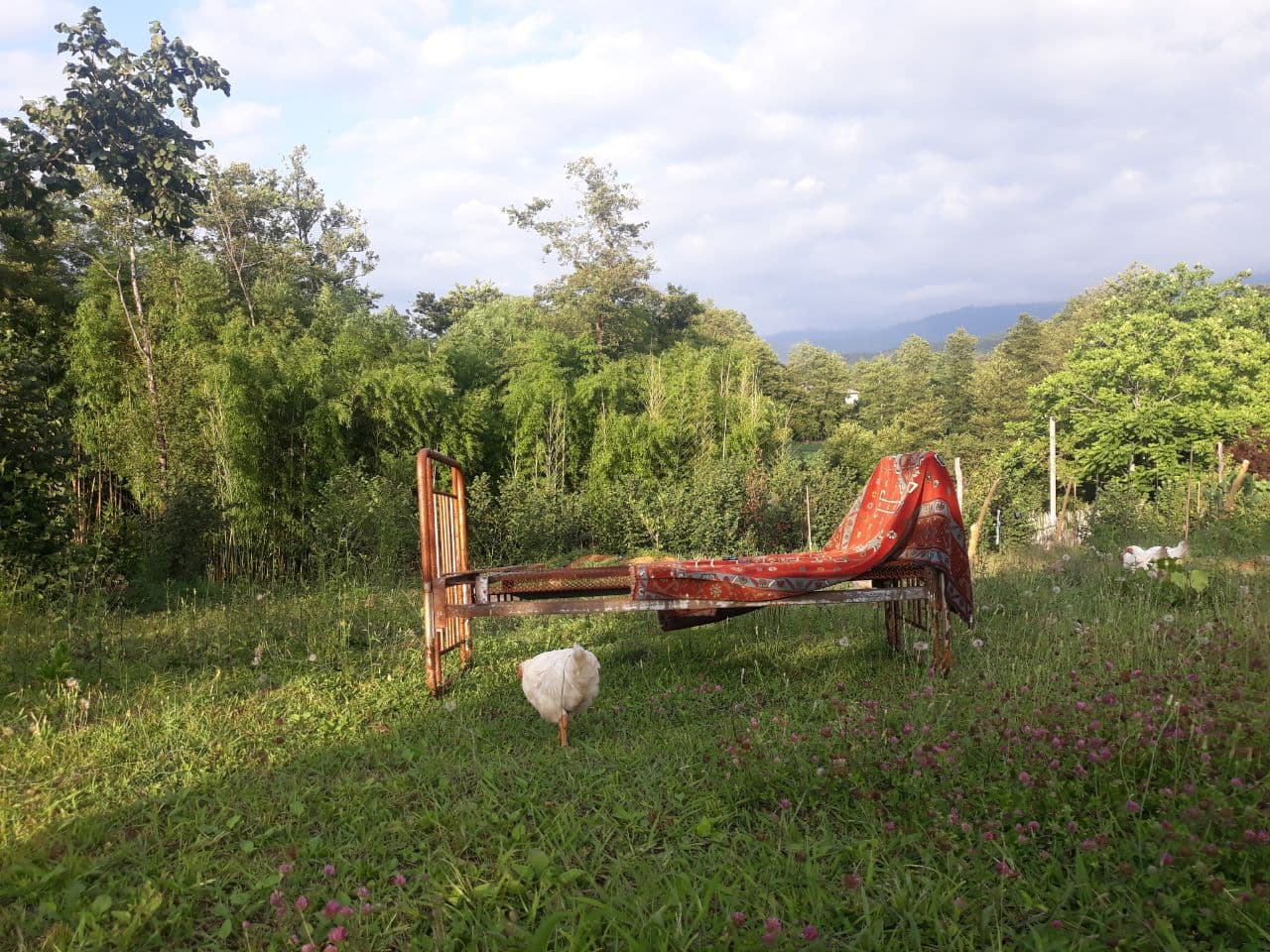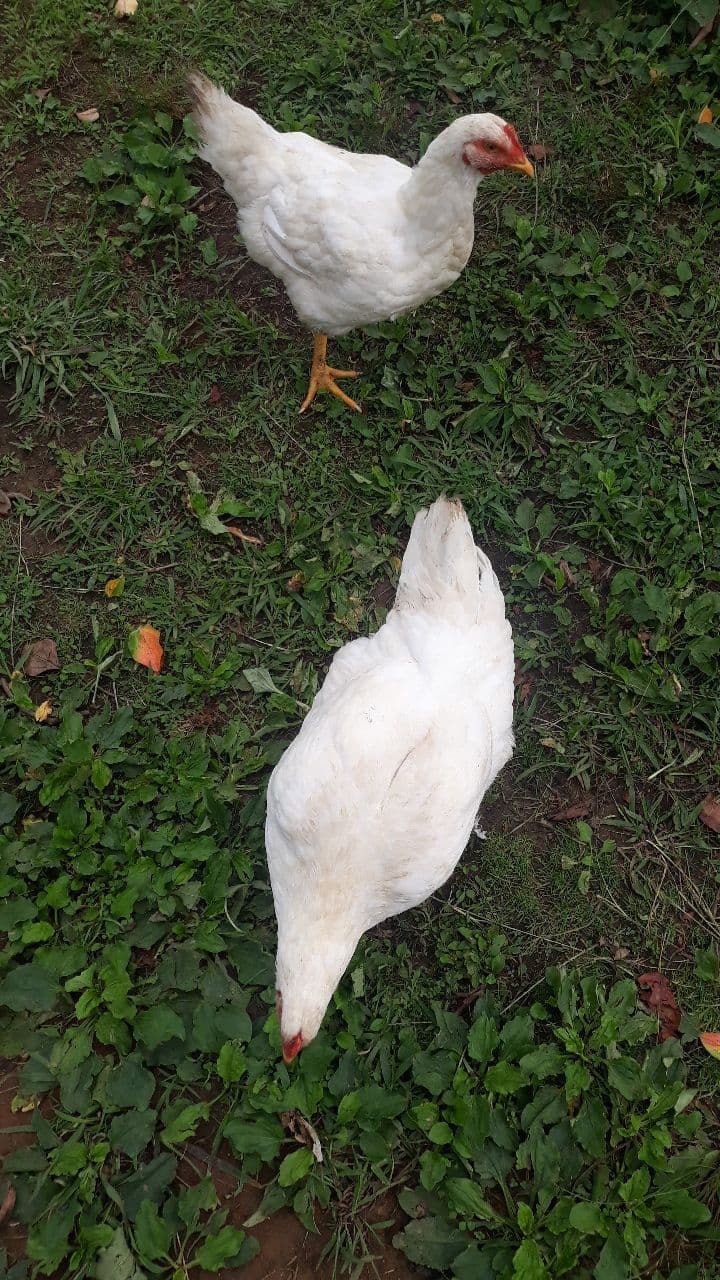Epigram
15 Dec 2020
Guria, days of summer, 2020
Beyond the relations we build with our own kind, there is another category of relation which is able to assign to our anthropocentric reality the resemblance of a fairy tale.
According to Huizinga a fundamental element that brings together various animal species is the intrinsic ability to play games: the act of playing as an universal language: a simulacrum: a moment of suspension in which tacit non written rules and fantasy behaviors are abided: the ability of playing is a strong signal - non necessarily the only – of the presence of consciousness since it demonstrate the capability to distinguish one dimension from another: one in which rules are set by our instincts of survival from one artificial and sewed with imagination.
Chickens belong to that category of animals intelligent enough, but unfortunately too naive, to be excellent playing partners, however due to our different natures and expectations the logics of the game leave open spaces of incomprehension that are often solved in a tragic and theatrical manner.
The protagonist of this story are nine dammed chickens, one sweet and fierce grandmother, few new friends, T., and me.
The scenography is the gurian countryside, a subtropical garden at the bottom of the skirt of the mistic Gomismta: Komli the name of our stage of fairy tales: we'd like to call them reality shows.
Summer falls on the chest of an obstinate and long lasting sun: journeys start with the call to breakfast. Chickens are awake, they are anxious in their chicken-house, they are hungry: they look like automats, they don't lay eggs, they only eat and yell.
To feed the chickens is a rite of passage: it is not just a simple task, it is the construction of an affectionate bond.
Nine are the chicken: all white: all the same: all boring: all interested in eating: all with a fixed and nervous stare.
\ Diba!Diba! Diba! Diba! Is the hymn that punctually two times a day we use to call them: we open the gates of their dorms, we feed them, they go around in the vastity of the garden, they eat insects, the fallen fruits from the trees, they wander around, they drink water, they rest under the shadow, they are brought back to their dorms before night sets, they sleep.
Inside of this apparent monotony observation towers are being built.
We are slowly entering into recreational currents: we are certain we have nine chickens until one morning, after the morning diba chant, we discover there are only eight.
We are surprised. Grandmother resign herself, we look after the lost one in vain.
Few days past and to our wonder we count nine chickens, we are happy and relief: she probably remained outside and took her a while to find her way back. That same night she has escaped again, this time for good.
Days are plenty, hot, and shining; eight chicken are filled with spirit: I discover they are picky eaters: a group of four is keen to violently make their way to eat the leftover of a watermelon, a couple of solitary ones prefer to eat plums, while the other two are in their quest for insects.
All of the sudden a chicken captures a caecilian: she show off her trophy and the others start to aggressively follow her: they fight, the worm pass from peak to peak is teared apart and abandoned.
Apples are the favorite treat of the eight. They make their way to them as if instead of chickens they were piranhas. If they don't get corn in a timely manner they start pinching your toes.
I only recognize the eight white chickens when I feed them: I have fun offering them any possible treat available in the garden and in the kitchen from the democratic stale bread, to corn, apples, plums, watermelons, melons, dry fruit, small pieces of meat and fish.
\ One day, while walking I discover myself being followed by them: whenever I move they move, whenever I stop they stop, if I try to chase them they escape and scream in every direction: we repeat the cycle: we are now playing.
\ Kids are more free and eloquent while playing games with them: they start right away, they try to capture them, they set them free, they torment them, they are chased back, chickens come with strategies to escape: one will always be captured: over and over again until it suddenly stops.
The game assumes a primitive value: is just fun, there is not second ending, it suddenly stops: eight chickens and men (or children) chasing each other in a subtropical garden.
We can recognize the gregarious, the rebels, the indifferent.

One night we forgot to bring them back to the chickenhouse: we discover them going to bed according to their nature: the gregarious are the first one to go, they stick together in a single block, the rebel ones tired of wondering and catching insects jump into the heads of their sisters, finally, in the initial darkness of the night, the independent ones either jump on the head of the others or stick aside.
One by one we bring them back to their dorms.
A new episode: an open conflict in the name of a game that starts to become a different call.
On a new morning: one of the white chickens us happy to be lonely and meerry in the garden: she escaped.
Primates vs Galliformes: this chicken escapes every morning: she digs a hole, she strongly pushes the weak gate, attempts to fly, she climbs. We cover the holes, we reinforce the gate, we leave food, more water, we tempted her to remain put: nothing. To every single solution we are pay with her determination not to stay inside with the others.
Another morning arrives and we find two white chickens free and merry: a leader and a follower: two rebels: sign of an upcoming revolution.
\ Grandmother asked to jailed them in a smaller cage, she does not like this behavior: she wants to set an example, an example doom to fail: these creatures are willing to take any opportunity of compassion shown to them to escape and repeat their behavior.
Potato harvest day has come, the chickens are roaming: is a happy day: we dig from the earth potatoes that surges like if it were a fountain,we feed the ugly ones, the half eaten by insects, the half rotten to the white chickens.
Some of them appreciate some others do not. They insist into being with us, they want to eat the good ones. Grandmother is not pleased.
Later that day we clear the soil, we will plant beans. We prepare the terrain, we put the seeds, we cover them with ashes, we cover them with soil. Is another joyful day.
I say goodbye to the chickens. I am on my way back to Tbilisi.
Next day I receive a cruel telegraphic news: chickens have been executed by grandmother orders.
Of all the food the could have eaten they decided to go and dig few beans out of the earth
To grandmother that was a big affront: she ordered their death: the game turned into a dare: if it was conscious or unconscious we will never know.